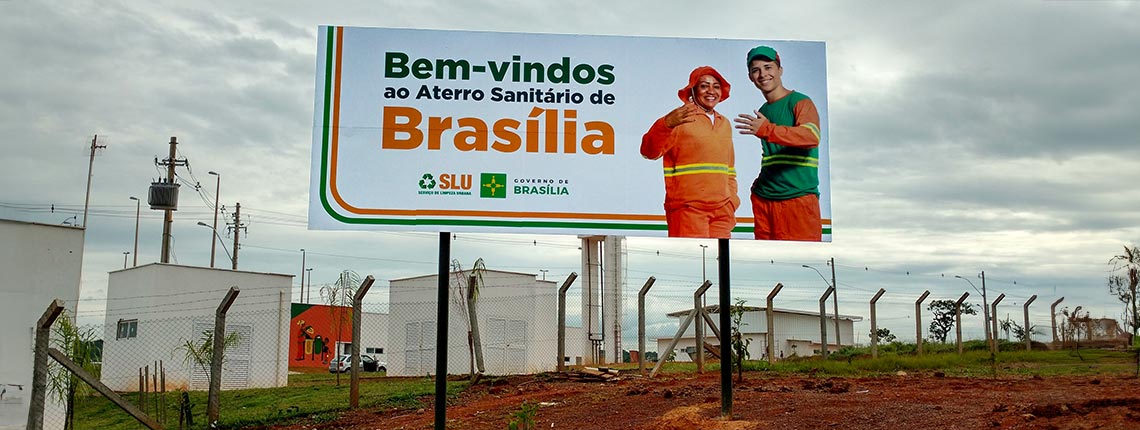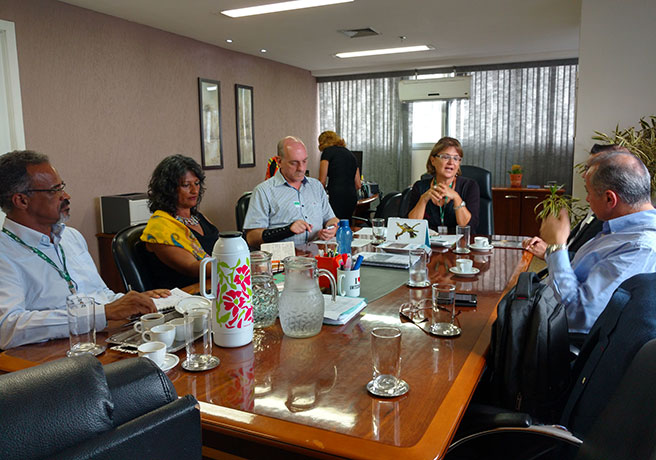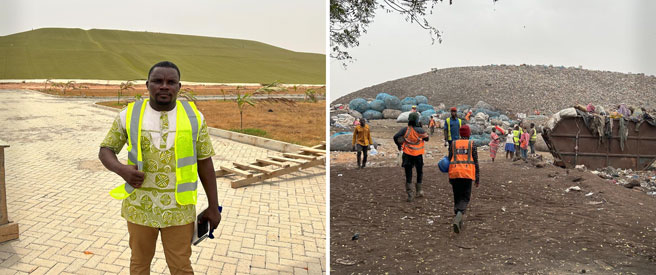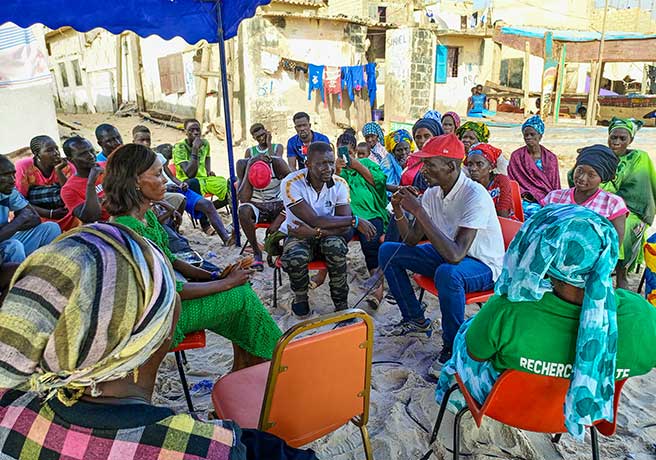With growing concerns around social and environmental impacts, pressure to close open dump sites is increasing. These processes often happen hastily and without due consideration for waste picker livelihoods. Experiences from Brasilia, Accra and Dakar show that the inclusion of waste pickers in dump closure plans is crucial for a just transition towards more sustainable waste management practices.
Brasilia, Brazil: A Comprehensive Approach
When the Estructural dump closed in 2018, Lúcia Nascimento, leader of the CORACE cooperative in Brasilia, had been working at the dump – Latin America’s largest – for 20 years. “On the 20th of January the dump was closed and we will never forget that date.”
The Estructural dump had been in operation since 1960 and, over the years, a village with over 40,000 inhabitants emerged on its outskirts. This was where waste pickers, who worked collecting thousands of tons of recyclables directly from the dump, lived and where recycling centres were located.
The dump was located at the base of a river vital to the water supply to the capital city, and therefore posed a significant environmental threat. Despite earlier judicial orders to close the dump, it wasn't until 2015 that the new governor of Brasilia, under pressure from the environmental prosecutor's office, took up the challenge. He committed to integrating waste pickers into the closure process.
A preliminary diagnosis identified 27 key problems related to the closure, and 17 government agencies were identified as having a role to play. An emergency plan was developed to address the most pressing issues. An epidemiological study was conducted to better understand the situation of waste pickers and the neighbouring community.
The government established a working group to create a plan to help waste pickers migrate to appropriate facilities, while forming organizations that could enable the government to hire them as service providers.
Organizations like WIEGO and reputable sanitation institutions in Brazil formed a monitoring committee to ensure that both environmental and social measures were being addressed. Various participatory platforms were created where workers could influence policy making around the closure of the dump.
In January 2018, the dump was closed and waste pickers transitioned to working in cooperatives. “When the dump was closed, it was a very difficult situation for us because even though we didn't have dignity [while working at the dump], we did make enough money for our livelihood,” says Lúcia.
However, through cooperation, they secured contracts for collection and sorting of recyclables, recycling warehouses and other key demands.
“If we consider the benefits that we are given by the government, we are at the level of the minimum wage and that at least is enough for us to survive. Now we are working in a safe place and we have several programmes, like health for women, and courses – and also many of us are going back to school. Those opportunities have been very important to us,” says Lúcia.
The process in Brasília demonstrates how governments can address environmental concerns coupled with livelihood protection, as has been advocated by WIEGO in its position paper on dump closures.
Accra, Ghana: A Missed Opportunity
In contrast to Brasilia's approach, the Kpone landfill in Accra, Ghana, was closed in June 2020 without proper livelihood safeguards for waste pickers.
The landfill, designed to receive 500 tons of waste, received 400 tons more than its capacity. A fire in August 2019 displaced about 300 workers to a nearby site. Then, in June 2020, in the midst of the pandemic, the landfill was decommissioned.
“We heard about the closure way back in March 2018 through media reports, the waste pickers were never officially informed about the closure,” says Dr Owusu Boampong, a Technical Consultant for WIEGO.
In April 2018, the World Bank introduced the Greater Accra Resilient and Integrated Development Project (GARID), which aimed to improve flood resilience and efficient waste management in Accra. Recognizing the potential impact on their livelihoods, waste pickers attempted to raise awareness and establish safeguards through actions taken with the support of WIEGO.
However, the World Bank's response was evasive, claiming that the landfill's decommissioning fell outside the project's scope. “This was basically an attempt to explain away the lack of consultation and safeguards for waste pickers, and also for them to evade accountability and responsibility in the project,” says Owusu.
In 2022, the Kpone Landfill Waste Pickers Organization, with WIEGO's support, formed a cooperative in the hope of securing service contracts for doorstep collection. However, this has not yet happened.
Meanwhile, WIEGO supported the waste pickers to scope for alternative livelihoods in coastal communities. The workers have received a grant that will kickstart doorstep collection in several neighbourhoods.
Dakar, Senegal: Mobilizing for Inclusion
Mbeubeuss landfill has existed since 1972 and many of those working on it are now organized in waste pickers’ association Bokk Diom.
Although the preparation work started in 2018, in 2021 the national government launched the Project for the Promotion of Integrated Management and Economy of Solid Waste (PROMOGED) to improve solid waste management, with the goal of restructuring and eventually closing the Mbeubeuss dump. With an emphasis on privatization, the project is financed by the World Bank, the Spanish Agency for International Development Cooperation (AECID) and the French Development Agency (AFD).
Three years into the project and following advocacy and mobilization by waste pickers, the President of Senegal pledged in 2021 the integration of waste pickers into the new waste management plans.
The idea is to close the landfill in 2026, but the changes towards privatization are moving at a fast pace, among them, the transformation of the state agency responsible for waste management into a private company. This could pose a threat to waste pickers’ livelihoods as it might increase competition for the very few jobs that will be created in the new facilities in Mbeubeuss and in the provision of doorstep collection services. Waste pickers are also finding increasing obstacles to accessing good quality materials. Waste pickers in Dakar have been advocating for their inclusion in PROMOGED and assurances that their livelihoods will be preserved. With support from WIEGO and the International Labour Organization (ILO), they established a cooperative. The waste pickers are also working towards creating a trade union, supported by WIEGO and the Confédération Nationale de Travailleurs du Sénégal (CNTS), to strengthen their position when engaging with authorities.
Similar to the project in Accra, waste pickers are raising awareness about their role in waste management and, amid insecurity about inclusion in the government’s plans, are exploring alternative livelihood options, such as doorstep collection.
Lessons learned
The comprehensive approach taken in Brasilia ensured a sustainable livelihood for waste pickers, well beyond what compensation could have achieved. It shows that livelihood restoration plans in combination with a roadmap is crucial, and that monitoring and evaluation mechanisms are important. Moreover, it illustrates that governments can play a positive role in spearheading integration, particularly when workers are organized and willing to engage.
In contrast, the missed opportunity in Accra and the ongoing efforts for inclusion in Dakar show the importance of consultation and participation to ensure that waste pickers' livelihoods are safeguarded during landfill closures.
Waste pickers play an important role in reclaiming recyclables that would otherwise be dumped, polluting the environment. Recognizing their contributions to climate change mitigation and including waste pickers in dump closures is crucial for a just transition towards waste management aligned with climate goals.
The content of this blog is drawn from the WIEGO webinar on dump closures.



